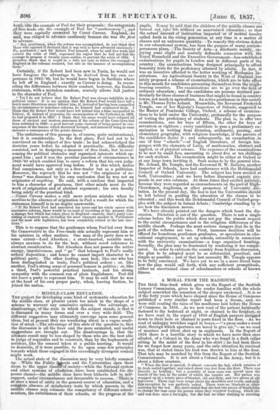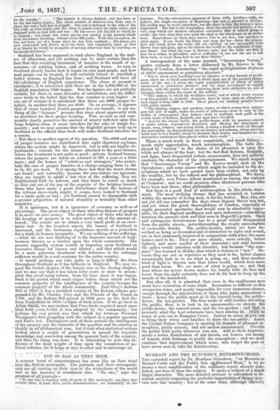A MORAL FROM THE MADHOUSE.
THE thick blue-book which gives us the Report of the Scottish LunacyCommission, gives to the reader familiar with the whole subject somewhat the sensation of the sleeper awakened. --It_is as if the forty: years Which have elapsed since the House of Commons Published a very similar report had been adream,:and,we were still reading the tales of the madhouse laid beforethe House of Commons in 1816. , As we now read of the patient habitually fastened to the bedstead at night, or „chained to the' flreplacso
. . _
we have read in the report of 1816 of English -paupers strajwsd down to their beds orchained to posts, fixed in the floor. =-As, we read of unhappy wretches caged in boxes,—" a press under a wood stair, through which apertures are bored to give air,"—so we read of maniacs and idiots shut up in cupboards. la the Report of 1816 there is a horrible story to which we have more than, onee alluded, of a Colonel in the Army who was found in dark cellar sitting in the midst of the floor m his shirt .; ,he had been there for we forget how many years, and the only attention he received was, that at stated times his food was thrownto him at the door. That tale may be matched by this from the Report of the Scottish Commissioners. It is not about a Colonel in the Army, but it is about a fellow creature.
"When the door is opened, it almost conceals the bed, which consists of fir deals nailed together, and raised about two feet from the floor. There was literally no bedding ; but a quantityof loose moss was spread upon the boardsof the bed, in the midst of which the lunatic sat. His person was wrapped up in a scanty piece of blanket, old and dirty, and two pieces of-old _bed-cover. These rags were wrapt about his shoulders and trunk, anthwiVh this exception he was perfectly naked. There were no blankets br, other oovering for the bed. His sister Stated that she had two pieces of blanketing to change the rags upon his person when they required washing, which she said vias done once a fortnight, but she hail no other clothing or covering
for the lunatic.". •. The lunatic is always chained, and has been so , for the last thirty Years.-,, The chain consists of thirteen iron links and is _about two anda balf feet in length: . One end is fastened to the side of the " bed with'. an iron staple, and the other is passed round hissight ankle, and • -fa:ste_ned with an iron bolt and nut. --He has never left the bed to which he is chained ; but about ten years ago he was carried to his present abode from his former dwelling, distant about 200 yards:, With this exception, he has not been out of a house since he. was first confined.-His knees are now contracted and drawn up to his chest, and completely rigid, so that if at liberty,he,would be incapable of moving otherwise than by crawling on
his hands and knees."
." Scotland has been supposed to rank above England in the matter of education, and yet nothing can be more certain than the fact that this revolting treatment of lunatics is the result of ignorance—of nothing better, and, of nothing worse. As soon as Scotland clearly knows how it treats its own mad people, and how mad-people can be treated, it will certainly labour to establish a better'system, as England has done; and Scotland will have all the'advantage of English experience. The abuse at present is `eicolainalS';. it is calculated that there are in the 3,009,000,X the population 7400 insane.: But the figures are not perfectly . certain; for there is sonic diversity of calculation, and the differnee tends to the belief that the true number is even higher : in one set of returns it is caleilated that there are 3960 pauper lunit*, in another that there are 4640. On an average, it appears that of every hundred Scotch paupers five are lunatic, to say no'thing ofahe fatuous " persons that stray about apparently with no proiiiion for their proper keeping. Now, as soon as any community clearly perceives the amount of misery inflicted upon this large helpless class, it must interfere for the sake of simple humanity; and we may assume that the frightful picture held up to Scotland in the official blue-book will make Scotland interfere for a rescue.
But there is another aspect of the question. The 4000 and more of pauper lunatics 'are distributed into eight chartered asylums, wher_e the system might be improved, but is still not highly ob. jectionable ; retreats for the insane attached to the poor-houses, where the treatment is not quite so good ; private licensed houses, where the paupers are taken on contract at 20/. a year or a little -more ; and the homes of "relatives and strangers," who under:take the care of pauper lunatics at a charge ranging from Is. 6d. to 28. 681. per week. It is among these last that the worst abuses -are found ; and naturally, because the care-takers are ignorant, „they are taught to adopt a low view of the suffering, they are familiarized with its horrors, and they learn to screw as much -Ais` their ein out of the pay at the expense of the helpless lunatic. Some who have made a great disturbance about the horrors of the African slave-trade might, it seems, have looked to Scotland for a trade quite as bad ; yet Scotland cannot be chargeable with a greater proportion of natural stupidity or brutality than other
• It is ignorance, but it is ignorance of economy as well as of physiology. The great.object.of those who thus dispose of paupers is.-to_save--to save money. The great object of those who deal in
t he keeping of paupers is to screw money out of the amount allowed.•, The results are to obtain a very small profit at an enor"maul cost,---In the broadest aspect,the lunacy of Scotland is increased and the barbarous regulations operate as a protection 'for a, trade inhuman incapaeity. We say nothing of the suffering, —what we are now thinking of is the immense amount of helplessness thrown as a burden upon the whole community. The present niggardly system results in imposing upon Scotland an excessive charge for lunacy and idiotcy ; and that which would be a more generous treatment with reference to the unhappy sufferers would be a real economy for the entire country. • It would perhaps not take quite so long to diffuse the ideas throughout Scotland as it has hitherto in England. We may regard the Scotch chapter of the lunacy ease as the closing chapter, and we may say that it has taken forty years or more to accomplish this great social reform, from the time since it was begun. Such is the period which must elapse before ideas which are the 'common property of the intelligence of the country become the .common property of the whole community. Earl Grey's Reform Bill of 1831-'2 was a modified version of the Reform scheme propoundectliy_bir.: Charles Grey and the Friends of the People in 1793, and the Reform Billpassed in 1832 gave us the first Reform Parliament in 1833.a raPse of forty years. If WC go back to
Adini we may reckon that Free-trade required much more than forty years before it ,was adopted' by the community; but
• perhaps the real period was that _ which lay between Perronet Thompson's first grappling with the subject as a popular question and Peel's Act. -Throughout each of these periods the intelligence of the country saw the elements of the question and its solution as -ledljãsairaiithinetical sum, but it took what statistical writers 'reckon about" a couple of generations to spread the requisite knowledge and conviction among the general body of the country, and then the thing was done. It is interesting to note this influence of the dead weight of time upon the completion of political reforms, for it helps at once to sober and to encourage us.



























 Previous page
Previous page